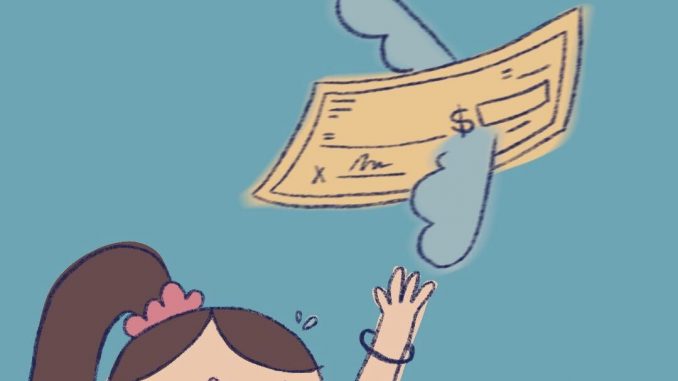
As a student, I work myself to the bone in classes only to exhaust my last bit of energy in the workplace.
Unfortunately, I’m not alone in this struggle.
In a 2018 survey of 17 million undergraduate students, about half are considered financially independent from their parents, meaning they are responsible for the majority of their college and living costs, NPR reported.
But, as a result of the COVID-19 pandemic, many students were furloughed from their work study jobs. A September 2020 population survey by the United States Bureau of Labor Statistics found that 12.5 percent of people ages 20 to 24 were unemployed, as compared to 6.3 percent the previous year, the State News reported. Moreover, college students need aid in alleviating the financial burden of living independently while obtaining a degree in the midst of the pandemic.
Last April, individuals and married couples in a certain income bracket received $1,200 and $2,400, respectively, under the Cares Act, CNBC News reported. On Dec. 27, 2020, President Donald Trump signed a second stimulus package, which provided an additional $600 for individuals, $1,200 for married couples and $600 for each dependent child, NBC News reported. The stimulus checks were meant to help revive the economy and cover some everyday expenses, like bills and food.
Despite the fact that many students are financially independent, their parents can file them as dependents on their income tax returns, making them ineligible to receive the stimulus checks.
Although dependents under the age of 18 received $100 more than they did in the previous round, one thing hasn’t changed: college students between the ages of 18 and 24 will still not receive a stimulus payment because they can be claimed as dependents on their parents’ income taxes.
Adults who are claimed as dependents, including college students, should not be excluded in the next stimulus package.
The stimulus check is a one-time payment, and while it would sustain in the short-term and provide for immediate needs, students from low-income backgrounds or those who are financially independent need even more assistance to make ends meet, said Dan Previti, a senior economics and risk management and insurance major.
“People who don’t need it more often than not simply store it, thus eliminating its purpose of ‘stimulating’ the economy,” Previti said. “Instead of sending a trivial amount of money to everyone, the government should provide a monthly stimulus to those who truly need it.”
Emalita Marcucci, a freshman education major, pays for tuition herself with the help of financial aid and is currently living with her parents due to the COVID-19 pandemic.
“I’ll be paying my rent myself, so saving up now is very important,” Marcucci said.
In addition to her 35 hours a week babysitting, 10 hours a week working at a restaurant and time on Temple University’s Cheerleading Team, Marcucci has 12 credits of school work. A stimulus check would help students like Marucci who work full-time while being a full-time student pay off a month’s rent or buy a few exorbitantly priced textbooks.
Stephanie Yanochko, a sophomore environmental studies major, is also part of the 58 percent of students who work in college.
“I paid off a full semester last year using savings and had to take out private loans this year to pay for tuition, housing and food,” Yanochko said. “I had three jobs at one point trying to save up.”
Parents can claim their children as dependents if they are full-time students up until the age of 24 and receive a tax break from the government, according to TurboTax.
In this case, even if a student is financially independent but was filed as a dependent, they will not receive a stimulus check, Vox reported.
If an individual believes they are eligible for independent status, they can take a “support test” to determine who provided more than half of their income. However, if they try to file as independents themselves, their parents may lose head of household status, costing them thousands of dollars on their tax bills, the Washington Post reported.
Many students have lost their jobs since the start of the pandemic and desperately need these funds to afford the sky-rocketing cost of higher education.
On average, a student at a public university in the U.S. spends $25,396 per academic year and is in over $32,000 of student loan debt after they graduate, Education Data.org reported.
President-elect Joe Biden had proposed a $1,400 stimulus check for most Americans after he is inaugurated, but the emphasis is on most, as adult dependents will be excluded for the third time, Fox 8 reported.
Despite the fact that I have three jobs, I can only afford to pay my rent through loans because I am a full-time student. Although a $600, $1,200 or even $1,400 check won’t do much, it would give me and other vulnerable students the wiggle room we need to prevent ourselves from plummeting deeper into debt.


Be the first to comment